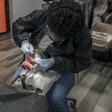Women in their 40s are more likely to have dental anxiety than any other age group, according to an ongoing University of Sydney study on dental anxiety and phobia.
The case-control study, now entering its fifth year, aims to help improve dental management for patients with dental fear, dental anxiety, and dental phobia, the university noted in a press release.
The study so far has found that women in this age group are most likely to have perceived a traumatic dental experience, abuse, trauma, and oro-facial trauma. They are also more likely to have higher levels of depression and general anxiety or suffer from stress. Character traits of perceiving pain in alarmist ways and poor coping with pain have strong correlation with dental anxiety, according to the researchers.
"Dental anxiety is very real and complex and it should never be downplayed," said Avanti Karve, BDS, MHSc, DClin Dent, study coordinator, and a special needs dentist on the university's faculty of dentistry."To date, despite all the advances in the dental field, dental fear is reported in up to 40% of the western population."
A recent national telephone survey found that a person with severe dental anxiety waits on average 17 days to make an appointment when in severe pain, as opposed to three days in the remaining population, Dr. Karve added.
According to Dr. Karve, the key to alleviating and managing this fear is to redirect the focus from the teeth to the whole person. For the last five years, she has been coordinator of the Dental Phobia Clinic at the Westmead Centre for Oral Health where the clinical team's approach includes a dietician, psychologist, sedationist, and anesthetist.
"At the center, we work with each patient to explore the history of their anxiety, identify specific triggers, and attempt to provide each individual with coping skills to manage their fear," she said. "We also look at underlying factors of dental disease and poor general health and aim to improve diet and lifestyle factors. In fact, our first consultations at the Phobia Clinic are not even conducted in a dental chair."
Going forward, the researchers want to investigate the relationship between pain perception, pain coping, and dental anxiety, as well as measure the success of pharmacological and non-pharmacological treatment approaches, according to Chris Peck, dean of the faculty of dentistry.



















